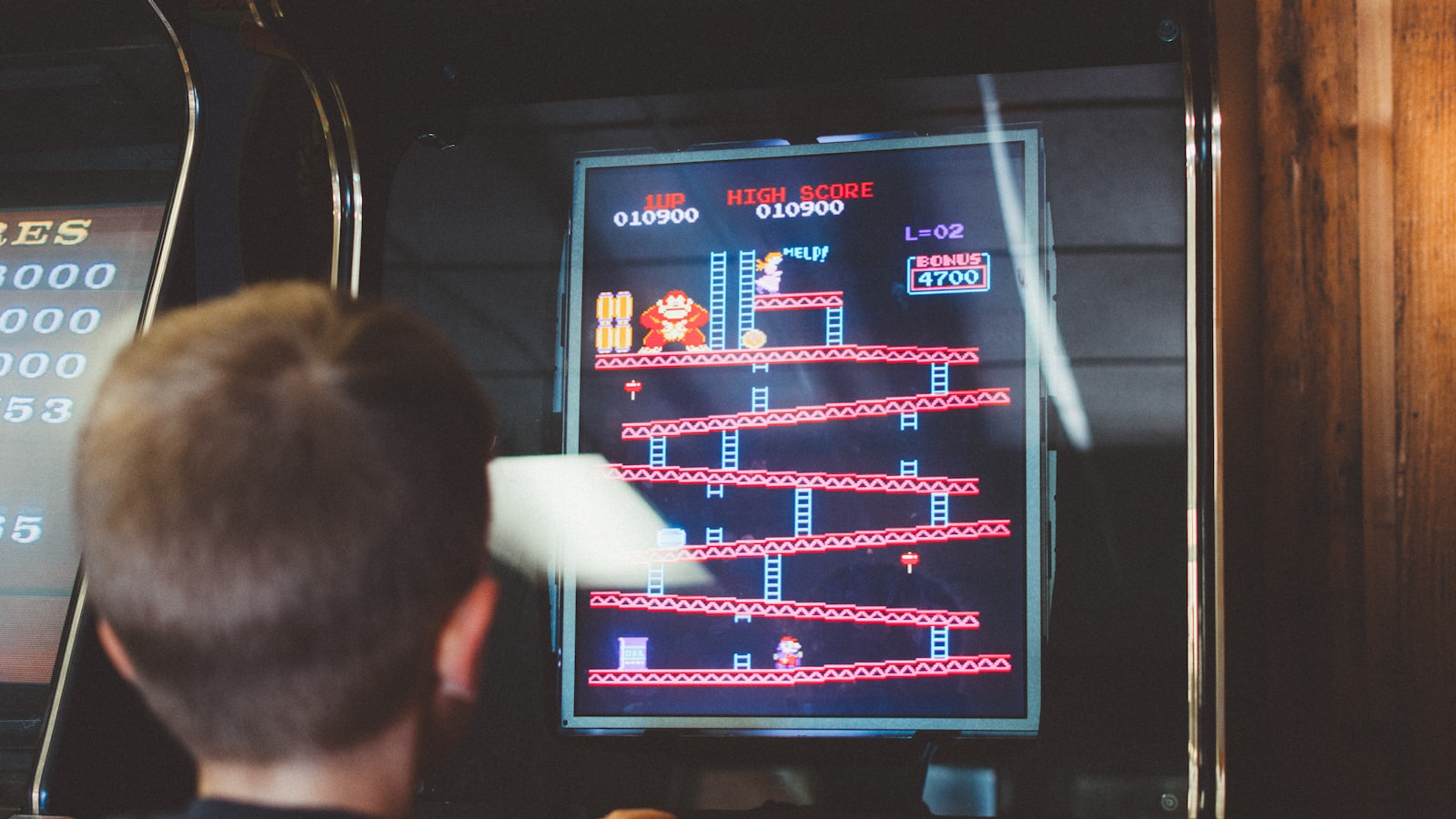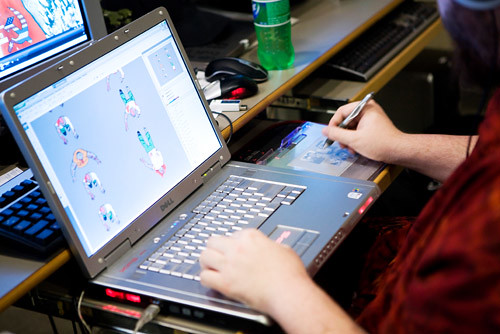Unleash your creativity and embark on a digital odyssey where imagination meets technology. Welcome to the extraordinary realm of game programming, a vast universe where coding language and logic intertwine to bring virtual worlds to life. This article is your gateway to understanding the mesmerizing art of game development, as we delve into the fascinating journey of mastering coding from scratch. Whether you’re an aspiring developer or simply eager to unravel the secrets behind your favorite games, prepare to delve into a captivating voyage that will revolutionize your perception of reality. So, fasten your seatbelts, adjust your headsets, and get ready to dive headfirst into the captivating world of game programming, where anything is possible with just a few lines of code.
The Power of Game Programming: Unlocking the World of Coding Language and Logic
Why Game Programming Matters:
Game programming is a fascinating realm that not only fuels our entertainment but also nurtures our cognitive abilities. Through the intricate world of coding language and logic, game programming empowers us to create dynamic virtual experiences that captivate and challenge players worldwide. By combining creativity and technical skills, game programmers unlock endless possibilities, where imagination takes form and digital worlds come to life.
1. Thinking Outside the Box: Game programming requires thinking beyond conventional boundaries. Developers employ advanced algorithms to solve complex problems, enhancing their logical reasoning and analytical thinking skills.
2. Collaboration and Teamwork: The game development process involves multidisciplinary teams where programmers, artists, and designers work together. This collaborative environment fosters effective communication skills and teaches the importance of teamwork throughout the project’s lifespan.
3. Real-World Applications: The skills acquired in game programming are transferable to various industries. From creating realistic simulations to developing interactive educational tools or designing cutting-edge virtual reality experiences, game programming holds immense potential for innovation and problem-solving in diverse fields.

Embarking on a Journey: Learning Game Programming from Scratch
Welcome, aspiring game developers, to an exciting adventure in the realm of game programming! Whether you have always been captivated by the magic of video games or you’re just starting to explore this fascinating field, this journey will take you from a complete beginner to a skilled game developer. Brace yourself for an immersive experience filled with learning, creativity, and the joy of turning your wildest ideas into interactive realities.
In this enchanting odyssey, you will unlock the secrets of game programming step by step, empowering you with the knowledge and skills needed to create your very own games. Prepare to dive deep into the world of coding, exploring languages like C#, C++, or JavaScript, and understanding the fundamental building blocks of game development. From character design and storytelling to game mechanics and level creation, you will be immersed in every aspect of crafting unforgettable gaming experiences.
- Discover the fascinating art of game design, breathing life into your ideas by creating captivating characters and immersive worlds.
- Learn to write clean and efficient code, mastering the programming languages that power the games we all love to play.
- Unleash your creativity and unleash the full potential of your imagination by designing engaging game mechanics that will keep players hooked.
- Explore the fine balance between challenge and fun, sculpting levels that will provide players with an unmissable and addictive experience.
Unveil the secrets of game development, unravel the mysteries of programming, and embark on an epic journey that will shape you into a master of the gaming universe. Grab your keyboard, summon your passion for games, and get ready to turn your dreams into reality, one line of code at a time!
Mastering the Fundamentals: Building a Strong Foundation in Coding and Logic
Welcome to the realm of coding and logic! In this exciting journey, we will delve into the intricacies of mastering the fundamental principles that lay the groundwork for becoming a proficient coder. Whether you’re a beginner looking to take your first steps or an experienced programmer seeking to strengthen your foundation, this guide is here to empower you with the essential skills and knowledge necessary to excel in the world of coding.
So, what does it take to build a strong foundation in coding and logic? It all begins with understanding the core concepts that underpin the magic of programming. From variables and data types to conditional statements and loops, mastering these fundamentals will enable you to express your thoughts and ideas through the mesmerizing language of code. Remember, just like constructing a sturdy building, a solid foundation paves the way for boundless creativity and innovation.
- Immerse yourself in the world of syntax: Embrace the syntax of various programming languages and explore their unique characteristics. The syntax is the grammar of coding, allowing you to communicate with computers effectively.
- Develop problem-solving skills: Coding is a puzzle waiting to be solved. Cultivate your problem-solving skills by breaking down complex problems into manageable chunks. Embrace the challenge and let your logical thinking guide you to elegant solutions.
- Practice makes perfect: The key to mastering any skill lies in consistent practice. Dedicate time to write code daily, even if it’s just for a few minutes. This consistent effort will reinforce the fundamentals and gradually transform you into a coding maestro.
- Engage with the coding community: Join online forums, attend coding meetups, and collaborate with like-minded enthusiasts. The coding community is a treasure trove of knowledge and support. Sharing your thoughts and learning from others will undoubtedly accelerate your growth as a coder.
Remember, building a strong foundation in coding and logic is a journey filled with discovery and excitement. Embrace each challenge as an opportunity to enhance your skills and expand your understanding. By mastering the fundamentals, you’ll have the power to create innovative solutions and bring your wildest ideas to life through the art of coding.
Game Programming: Tools, Tips, and Tricks for Success
In the world of game programming, having the right tools is essential for success. Whether you’re a seasoned programmer or just starting out, the right tools can make all the difference in creating your masterpiece. One essential tool that every game programmer should have in their arsenal is a powerful integrated development environment (IDE). An IDE not only provides a text editor for writing code but also offers features like code completion, debugging tools, and project management. Some popular IDEs for game programming include Visual Studio, Unity, and Unreal Engine.
Aside from having the right tools, there are also tips and tricks that can greatly improve your game programming skills. One important tip is to break down your game development process into smaller tasks. By breaking your project into manageable chunks, you can maintain focus and systematically tackle each aspect of your game. Additionally, continuous learning is crucial in the ever-evolving world of game programming. Take advantage of online tutorials, forums, and communities to expand your knowledge and keep up with the latest trends. Lastly, don’t be afraid to experiment and think outside the box. The world of game programming thrives on innovation, so try new techniques and explore different approaches to create unique and captivating games!
Closing Remarks
As we now bid adieu to our journey through the exciting realm of game programming, it is with joyful satisfaction that we reflect upon the foundational knowledge we have acquired. From navigating the intricacies of coding languages to unraveling the enigmatic logic behind game design, our minds have been set ablaze with creative possibilities.
Like an artist with a blank canvas, we have learned to wield the brush of programming, crafting virtual landscapes and characters, breathing life into pixels and lines of code. Step by step, we have dismantled the veil shrouding the mysteries of game development, empowering ourselves with the tools to bring our wildest imaginations to life.
But as our exploration of this captivating domain concludes, we cannot help but acknowledge the humble beginnings we embarked upon. We started with a blank slate, devoid of any prior knowledge or experience. And, like a phoenix rising from the ashes, we have emerged with a newfound sense of confidence and understanding.
Our journey was not always smooth, as we navigated complexities and overcame obstacles. Yet, with unwavering determination, we persevered, fueled by the anticipation of witnessing our ideas materialize before our very eyes. We have explored the depths of coding languages, deciphering their intricacies and harnessing their power to mold the gaming landscape.
Moreover, we have delved into the captivating world of logic, unraveling its secrets and weaving our own tales of interactive wonders. Our minds have been honed to think algorithmically, devising innovative solutions to every puzzle encountered along the way. The ability to think critically and approach problems with a logical mindset has become second nature to us.
As we wrap up this exhilarating adventure, let us not forget the bond we formed with fellow aspiring game programmers. We shared triumphs and setbacks, supported each other through the challenging moments, and celebrated the triumphs together. We have fostered a community where ideas are shared freely, creativity is nurtured, and encouragement flows abundantly.
In conclusion, this introduction to game programming has been both a thrilling expedition into uncharted territory and a solid foundation upon which to build future endeavors. The skills and knowledge we have acquired will undoubtedly serve as a launching pad for even greater achievements. As we bid adieu to this chapter, let us carry the flames of creativity, logic, and a thirst for learning into new horizons of game programming excellence!
Introduction to Game Programming: Learning Coding Language and Logic from Scratch
The world of game programming can be an overwhelming and challenging arena for the novice programmer, but with the right effort, determination, and resources, it can be immensely rewarding. This article will introduce the reader to some of the essentials of game programming. Specifically, we will discuss the basics of programming languages, the fundamentals of game logic and design, and the best approaches to learning and mastering this skill set.
Programming languages are the structure upon which games are built. To make a game work, the developer must write code in one or more programming languages. There are a variety of popular languages used for game development including C++, Java, C#, JavaScript, and Python. Each language has its own syntax and uses specific instructions for telling the computer to execute a task. With enough practice and dedication, anyone can learn to create a game from scratch using one of these languages.
Next, we need to understand game logic and design. Although coding is necessary for a functional game, it also needs a well-crafted game design. This means that the game must be organized around a particular genre or story. Game mechanics must be planned out, levels, enemies, and challenges must be appropriately placed for a challenging experience. Additionally, graphics must be carefully crafted to give the game a unique look and feel.
Finally, we must discuss the best approaches to becoming a successful game programmer. This is something that comes with experience, but there are a few tips that may help the new programmer. Firstly, developing a healthy approach to programming is important for success. This means staying organized and making sure to document changes to your code. Secondly, practicing coding by writing simple pieces of code and revising them will help develop the skills and confidence needed to tackle a more complex project. Thirdly, utilizing the mentorship of experienced game developers to provide guidance and advice can go a long way in furthering a developing programmer.
In conclusion, game programming can be a daunting endeavor for a beginner but with the right dedication and resources, it is possible to create amazing games. Understanding the necessary programming languages, game logic and design principles, and best approaches to learning will help create the solid foundation a successful game programmer. With hard work, these concepts can be mastered, and the world of game development can be opened.



